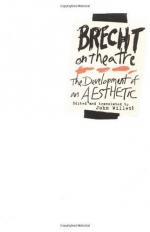
|
| Name: _________________________ | Period: ___________________ |
This quiz consists of 5 multiple choice and 5 short answer questions through 1933-1947 (Exile: Scandinavia, USA), Section 2.
Multiple Choice Questions
1. _____ is a lament to man's failure to understand the laws governing his life in society.
(a) Galileo.
(b) Die Mutter.
(c) Mahagonny.
(d) The Threepenny Opera.
2. What does Brecht say put a stop to epic and didactic tendencies of theatre in Berlin?
(a) Fascism.
(b) Apathy.
(c) Capitalism.
(d) Communism.
3. Piscator's Theater am Nollendorfplatz was based on _____ principles.
(a) Communist.
(b) Marxist.
(c) Aristotelian.
(d) Capitalist.
4. Where did Helene Weigel give acting lessons at theatre school, possibly using Brecht's list of exercises?
(a) Paris.
(b) Moscow.
(c) Scotland.
(d) Finland.
5. How did Brecht characterize Shaw's work in "A Catching Infection: Fun"?
(a) As tediously pedantic.
(b) As addictively engrossing.
(c) As extraordinarily healthy.
(d) As ego-driven.
Short Answer Questions
1. What example does Brecht use to explain his concept of art following reality in "On Form and Subject Matter"?
2. What does the word 'Spass' mean in German?
3. What does Brecht call people who came to the theatre to get their cockles warmed in "Conversations with Bert Brecht"?
4. Who does Brecht mention in association with London theatre when he talks about the theatre centers of the world?
5. Who was the interviewer in "Conversations with Bert Brecht"?
|
This section contains 200 words (approx. 1 page at 300 words per page) |

|




